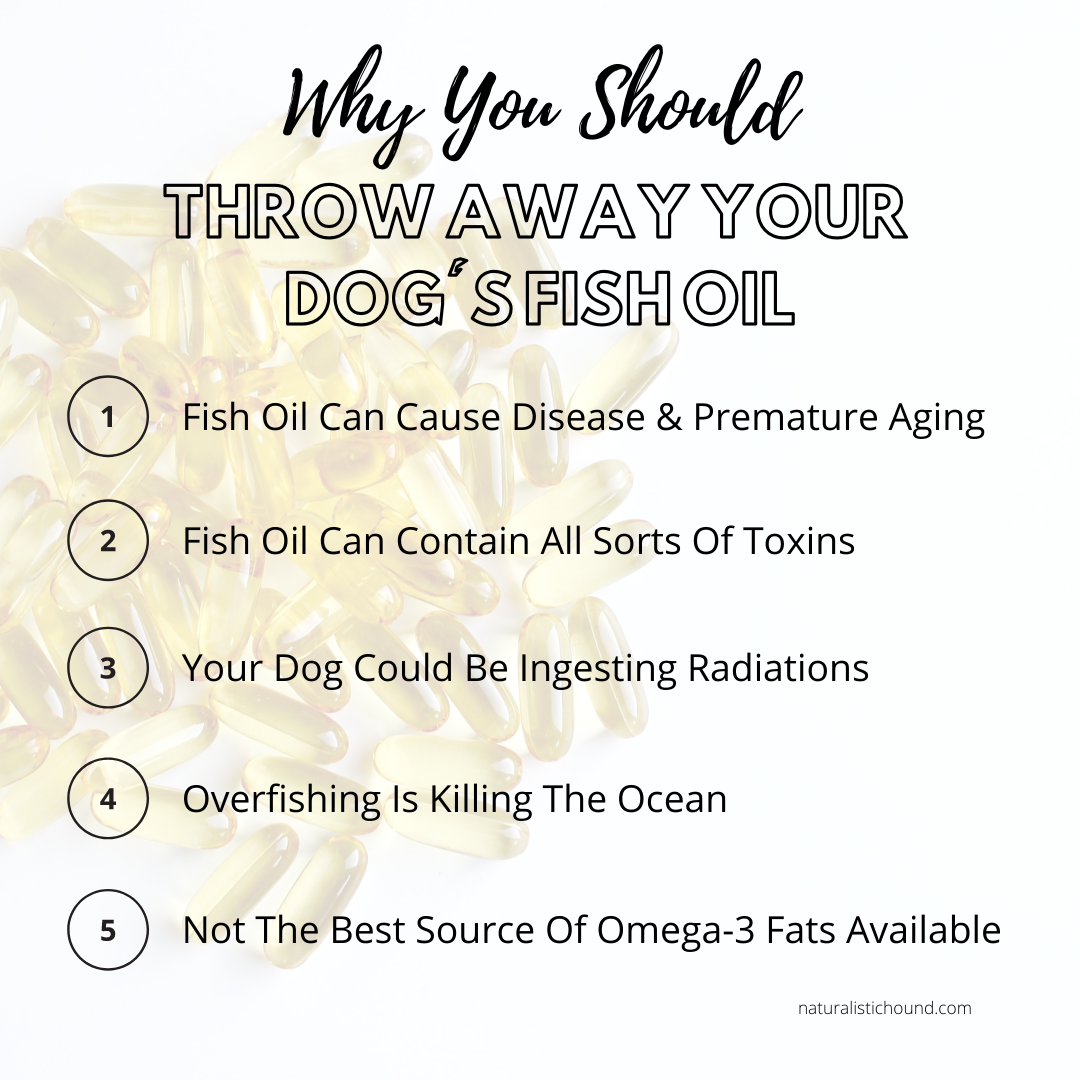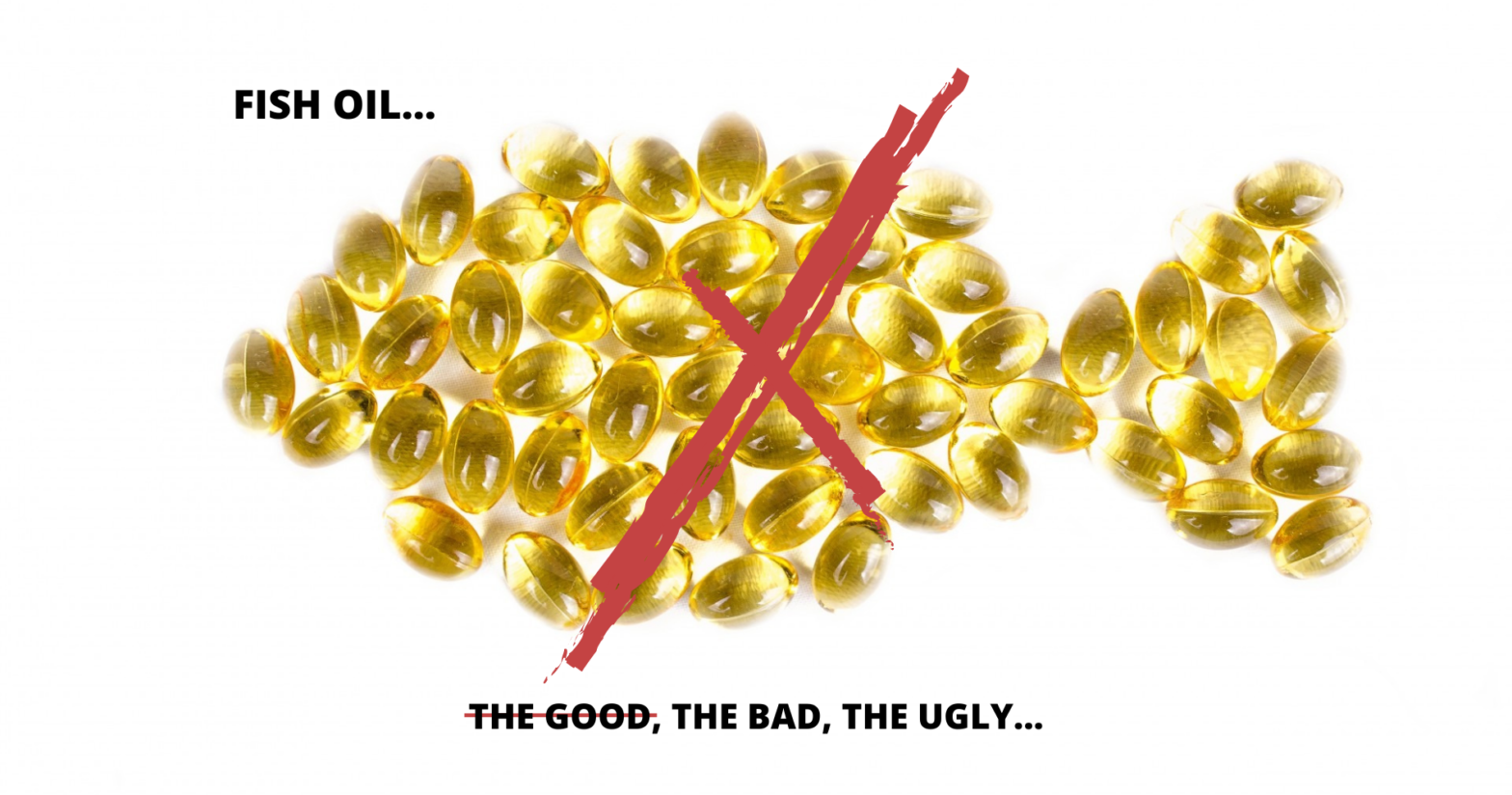If you are thinking of feeding Fish Oil, or you are already feeding it to your dog, you may be in for an unpleasant surprise.
A few years ago, I threw away all my dog’s Fish Oil and perhaps you will do the same after reading this post.
Fish Oils, rich in n-3 PUFAs, have become one of the most popular dietary supplements worldwide with millions of regular consumers. That is why it is time to review some of the reasons why you should change your mind on feeding fish oil to your dog.

1. Fish Oil Can Be The Cause Of The Diseases You Are Trying To Prevent
Dogs need Omega-3 fats, and you may think it is a good idea to add fish oil to your dog’s everyday diet. After all, we know that Fish Oil contains fatty acids.
Most dogs get too much Omega-6 fats in their diet. And feeding them lots of foods with a high amount of Omega-6 fats leads to an increase in inflammation in the body. The excess inflammation is extremely dangerous, because chronic inflammation leads to many health issues including, allergy symptoms, joint pain, diabetes, auto-immune diseases, and more.
This is one reason we need to add Omega-3 fats to our dog’s diet so they can balance out those Omega-6 fats to reduce inflammation in the body.
If the reason for feeding fish oil is to add Omega-3 fatty acids and reduce the risk of diseases in your dog… Then we may have a problem.
While Fish Oil does contain Omega-3 fats, EPA and DHA, and they are a healthy addition to his diet, these health benefits are cancelled out by the disadvantage of fish oils.
The Omega-3 fatty acids in Fish Oil are extremely vulnerable to oxidative damage.
When the fat particles in the oil are exposed to oxygen (this is called oxidation), they break down into smaller compounds, called malondialdehyde (MDA) and they create oxygen-containing molecules called free radicals.
Both MDA and free radicals cause premature aging and disease. This is because they damage proteins, DNA, and other important cellular structures.
Oxidative stress leads to several health problems, the most common include cancer, and inflammatory conditions (yes, the same conditions you are trying to prevent feeding Fish Oil!).
2. Fish Oil Can Contain All Sorts Of Toxins
Although the fats stored in fish are loaded with Omega-3s, fat is also where toxins are stored. Considering that our oceans are becoming more and more polluted with heavy metals like arsenic, cadmium, lead, and mercury as result of modern industry, more toxins are being stored in this fat.
Mercury and especially methylmercury, have been linked to toxicity if ingested or inhaled in large amounts, this led to recommendations that women who are pregnant, planning to become pregnant or breastfeeding as well as young children should avoid certain types of fish and shellfish. All fish and shellfish contain methylmercury, but some species contain more than others.
One of the main ways of fish becoming contaminated with mercury is through industrial waste. The emissions produce airborne mercury that eventually falls to the ground and contaminates the water. Then some microorganisms, like bacteria and fungi, are known to convert mercury to methylmercury (one of the more toxic forms). The fish and shellfish who feed in these water sources will then absorb the methylmercury. Fish and shellfish who are larger and live longer will have absorb greater amounts of methylmercury as compared to smaller and younger fish.
It makes sense to assume that Fish Oil supplements derived from fish containing methylmercury would have a good chance of containing methylmercury as well.
Heavy metals can cause many health issues including, nervous system dysfunction, blindness, certain type of cancers, irreversible liver and kidney damage and even death.
Along with heavy metals, there are other toxic elements that can accumulate in fish: polychlorinated biphenyls (PCBs)were banned in 1979 but they are still found in the oceans and in fish.
PCBs can cause skin problems, muscle spasms, bronchitis and nervous system disorders, liver issues, immune system problems, endocrine and reproductive disruptions and the development of certain type of cancers.
Fish Oil manufacturers will state their products are free of toxins, but independent lab analyses may show otherwise. It is important to ask for a certificate of analysis, done by an independent lab before you buy any fish oil. Even if sometimes also tested Fish Oil can be found positive and still be sold [1].
3. Your Dog Could Be Ingesting Radiations
If the above were not enough; rarely Fish Oils state their fish origin, and you could find yourself feeding your dog radioactive Fish Oil. In 2011, the Fukushima nuclear power plant was hit by a tsunami and its reactors melted down. This caused radioactive water to seep into the Pacific Ocean. Consequences were seen up to the west coast of North America, were most of the marine life was contaminated. Including the salmon that is commonly used for fish oil.
4. Overfishing Is Killing The Ocean
“Overfishing is the removal of a species of fish from a body of water at a rate that the species cannot replenish, resulting in those species becoming underpopulated in that area.”
Fish Oil is made from fish caught from the oceans and in the process bycatch occurs.
The nets trap everything larger than the net’s mesh, which includes young fish, sharks, seabirds, marine turtles, and cetaceans (whales, dolphins etc). More than 650,000 marine animals, including dolphins, whales, seals, and turtles, are killed, or injured in fishing nets each year. And from 1970 their population numbers have been halved.
As we know, overfishing is a big issue – an example of the damages of overfishing are menhaden fish, one of the most caught fish for Omega-3 fats – and most commonly used in pet foods. The menhaden fish are so important for the ocean because they clean it: menhaden fish is one of the few kinds of fish that can digest the cellulose in plants and feeds on that type of algae created by fertilizer that flows into the ocean. An adult menhaden can filter 5,760 gallons of water in one day. This filtration ensures that sunlight penetrates to the bottom, allowing photosynthesis for aquatic plant life.
Krill oil, another kind of Fish Oil, is not a better choice.
Krill are the whale’s main source of food – a single whale can eat nearly 5 tons of krill a day.
Scientists think that krill populations have fallen by 80% since the late 1970s.
5. What Is An Alternative To Fish Oil?
Dogs still need Omega-3 fatty acids to fight excess inflammation and achieve optimum health…
But the answer is not Fish Oil…
Fish are not born with high levels of Omega-3.
They need to get Omega-3 from their diet, which means from eating small creatures who previously fed on Phytoplankton (see the full post about Phytoplankton and its benefits here!).
Half of Phytoplanktons composition is, by weight, Omega-3 fats, which is about double the amount found in fish; they are a perfect source of Omega-3 and fatty acids DHA (docosahexaenoic acid) and EPA (eicosapentaenoic acid).
There are plant-based sources of Omega-3 fats that you can feed to your dog, but he will not be able to convert them as well to get the health benefits.
That is why Phytoplankton is a great alternative source for Omega-3 fats.
Phytoplankton is an environmentally sustainable product, NOT taken from the oceans: people may be concerned that Phytoplankton might be detracted from the oceans, impacting other organisms. Phytoplankton can be grown in filtered water in farms, in ecologically sustainable conditions and you do not have to worry about heavy metals, radiation, and toxins, or its impact on the oceans.
Let’s build a Complete, Balanced & Personalised Diet for your Dog!
Naturalistic hound
Click here: Nutrition & Recipes
[1] Lawsuit claims PCBs found in 10 fish oil supplements; product labelling sought.

